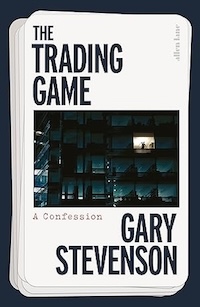I’m familiar with Gary Stevenson for his campaigning on inequality so I knew about his backstory as a financial trader, and how he got his start by winning a card game. It’s a great anecdote, but I wondered if there was enough there to fill a book. Well, there definitely is. Even if you don’t share his politics, The Trading Game is a thrillingly entertaining read.
It has the arc of a rock biography – the poor kid who wants to make it, the struggle for success, then disillusionment, just as he’s achieved it.
Stevenson grew up in a working-class family in East London, in the shadow of the towers of Canary Wharf. The financial district is in touching distance but a world away.
His talent for Maths wins him a place at the London School of Economics and he is determined to work hard to make the most of his ability. However, he describes his gradual realisation that gaining entry to a career in investment banking has little to do with academic success and is much more about having the right contacts and CV.
 Then someone tells him that Citibank recruits one person each year based on a card game. The game requires both mathematical skill and trading nous. Stevenson puts all his energy into preparing for the game. At the end, he wins the opportunity to intern at Citibank and try to make his mark.
Then someone tells him that Citibank recruits one person each year based on a card game. The game requires both mathematical skill and trading nous. Stevenson puts all his energy into preparing for the game. At the end, he wins the opportunity to intern at Citibank and try to make his mark.
He goes from intern to the bank’s most profitable trader. He does this by betting that economic policies after the 2008 crash would escalate inequality and make most people poorer. The consensus among economists and policy makers was that as central banks pumped more money into the economy there would be a swift recovery. Stevenson saw that the money was benefiting large companies and wealthy individuals by inflating the price of assets at a time when wages were falling. They could use those assets to generate income and buy more assets, increasing the gulf still further.
Stevenson’s success makes him uncomfortable. He sees the injustice of the system which has enabled that success. His sudden wealth contrasts grotesquely with the lives of the people he has grown up with. He is also working incredibly long hours and is exhausted. He tries to leave, but Citibank don’t want to let him go, and they are holding onto his bonuses. Stevenson is determined to leave and take the money, so a war of attrition ensues.
Stevenson’s voice comes through vividly in The Trading Game. He sounds exactly like he speaks. (If you’re the sort of person who takes to Goodreads to lament the use of “curse words” you might want to sit this one out.)
He is brilliant at explaining economic and financial concepts in a user-friendly way. He has a very dry sense of humour which comes through especially in his descriptions of his fellow traders. His fish-out-of-water perspective skewers the absurdity of the world he finds himself in, but he also shows humanity in seeing their struggles and flaws.
He says little about his private life, perhaps to protect those close to him, but there are some beautifully understated moments, particularly about one relationship.
The Trading Game is a great page-turner which also has a lot to say about inequality, both as a policy issue and at the personal level: the way it is corrosive to society and to our closest relationships.
I received a copy of The Trading Game from the publisher via NetGalley.
View The Trading Game on Goodreads